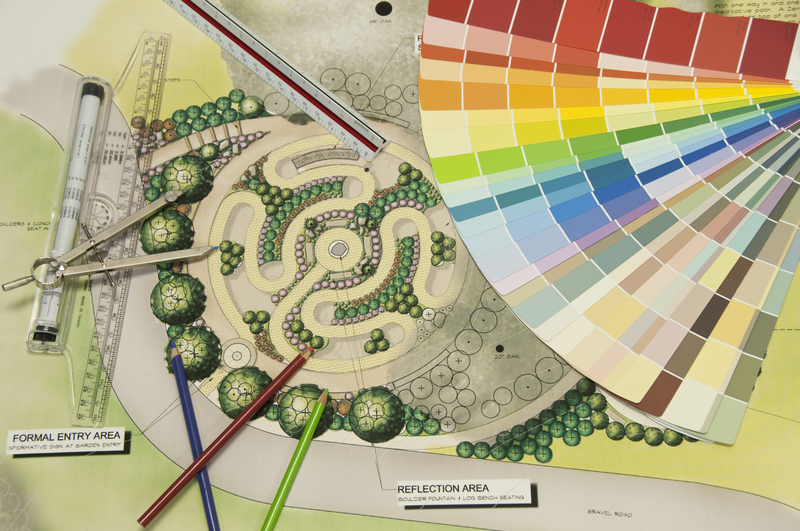Cultivating Calm: Zen Gardens for a Tranquil Outside Space
Posted on 09/06/2025
Cultivating Calm: Zen Gardens for a Tranquil Outside Space
In the fast-paced world we live in, creating a peaceful escape right in your backyard has become more essential than ever. One of the most soothing and visually stunning ways to embrace serenity is by cultivating a Zen garden. Zen gardens are more than just a beautiful landscaping feature--they're a philosophy, a meditative practice, and a gateway to tranquility. This in-depth guide explores how to design, build, and nurture your own Zen garden to foster a tranquil outside space.
What Is a Zen Garden?
A Zen garden, or karesansui in Japanese, is a minimalist dry landscape garden. Traditionally featuring sand, stones, moss, and carefully chosen plants, these gardens are designed to facilitate contemplation and insight. The arrangement of the elements in a Zen garden serves as a physical manifestation of harmony and simplicity, encouraging the mind to reflect and unwind.
- Origins: Rooted in Japanese temples and monasteries, Zen gardens date back to the 8th century.
- Purpose: Originally created for meditation and spiritual reflection.
- Design: Incorporates natural elements to symbolize mountains, rivers, and islands.

Why Choose a Zen Garden for Your Outdoor Space?
Are you seeking a sanctuary to destress, reflect, or simply connect with nature? A Zen-inspired garden offers numerous benefits:
- Mental Clarity: The minimalist layout reduces sensory overload, promoting focus and relaxation.
- Low Maintenance: Unlike traditional gardens, Zen gardens require minimal plant care, making them ideal for busy lifestyles.
- Aesthetic Appeal: Clean lines and harmonious arrangements create a timeless elegance.
- Year-Round Beauty: Evergreen elements and carefully chosen rocks mean your garden is visually appealing through every season.
Design Principles of Zen Gardens
Cultivating tranquility in a Zen-inspired outdoor haven requires more than just placing a few rocks and raking sand. There are key design principles at play that shape the essence of these sacred spaces:
The Importance of Simplicity
Zen gardens celebrate the art of less. Every element is deliberately chosen and positioned, eliminating clutter and embracing *minimalism*. Limit your components to those that genuinely contribute to the peaceful ambiance.
Symbolism in Elements
Each piece in a Zen garden carries meaning. Rocks stand in for mountains or islands, sand ripples become flowing water, and moss or small shrubs evoke lush forests. Balance and symbolism are fundamental to achieving harmony.
Asymmetrical Balance
Unlike formal Western gardens, Zen gardens favor asymmetrical compositions. Stones are often grouped in odd numbers to foster a more organic, natural flow.
Emphasis on Texture
Raked gravel, rough boulders, smooth pebbles, and soft moss--all these textures invite touch, inspire contemplation, and heighten sensory awareness.
Planning Your Tranquil Zen Garden
**Transitioning your outside space into a Zen retreat begins with thoughtful planning.** Take these key factors into account:
- Location: Choose a flat, sheltered area with good drainage and minimal foot traffic.
- Size: Zen gardens can be large or compact, from an expansive backyard sanctuary to a small balcony feature.
- Orientation: Consider sunlight, focal points, and privacy to maximize tranquility.
- Budget: Select materials and plants that fit your resources while maintaining harmony and simplicity.
Choosing Elements for Your Zen Garden
Here are the fundamental components for cultivating a serene Zen garden outdoors:
- Rocks and Stones: The backbone of Zen design. Group contrasting shapes and sizes for visual interest and symbolism.
- Sand or Gravel: Represents water. Rake it into swirling, wave-like patterns for a calming effect.
- Moss and Ground Cover: Softens hard edges and brings a *touch of life* to dry landscapes.
- Bamboo or Wood Features: Fences, screens, or bridges for subtle enclosure and rustic charm.
- Lanterns, Basins, or Sculptural Accents: Provide gentle focal points without overwhelming the peaceful composition.
- Minimalist Plants: Japanese maples, dwarf conifers, ferns, or ornamental grasses for accent and seasonal interest.
Step-by-Step Guide to Creating a Zen Garden
Ready to transform your yard into a Zen sanctuary? Follow these steps to cultivate your own calm outdoor retreat:
1. Define the Space
Mark out the area for your garden using string or stakes. Consider natural borders like existing trees, a hedge, or bamboo fencing to add privacy and focus.
2. Prepare the Ground
Remove grass, weeds, and topsoil to create a clean base. Lay down a weed barrier fabric if desired, then add a sturdy frame using timber or stone edging.
3. Place Rocks and Stones
Position large stones first; imagine them as mountains or islands. Group them in naturalistic clusters, leaving space for sand or gravel in between. Use odd numbers and irregular arrangements for an authentic Zen aesthetic.
4. Add Sand or Gravel
Fill the area with a generous layer (at least a few inches) of fine gravel or sand. Use a rake to create calming ripple patterns that suggest water flowing around the stones.
5. Introduce Plants and Moss
Plant moss in shaded areas or nestle low-growing plants near rocks for contrast. Choose species that thrive in your climate and require minimal upkeep.
6. Enhance with Accents
Decorate thoughtfully with bamboo screens, stone lanterns, or a simple water basin (*tsukubai*) for a touch of authenticity. Avoid overcrowding--less is more in a Zen landscape.
Maintaining a Zen Garden for Ongoing Tranquility
A Zen-inspired garden is more than a one-time project--it's an ongoing relationship with nature and mindfulness. To keep your space peaceful and beautiful:
- Rake sand regularly to refresh patterns and maintain order.
- Remove debris, fallen leaves, or weeds to protect the garden's serenity.
- Prune shrubs and moss sparingly to preserve clean lines and natural forms.
- Reflect and redesign as needed: Zen design encourages flexibility and subtle change over time.
The Meditative Power of Zen Gardens
The true magic of cultivating a Zen garden is not just in its physical beauty, but in the mental calm it brings. Engaging with your Zen-inspired space--whether by raking sand, meditating, or simply sitting quietly--helps:
- Reduce stress and anxiety through focused, repetitive motions.
- Encourage mindfulness and presence in the moment.
- Promote gratitude and awareness for natural beauty.
- Foster creativity and problem-solving through contemplation.
Modern Zen Garden Ideas for Tranquil Outdoor Spaces
Contemporary life often calls for personal touches and creative expressions. Here are some ideas for modern Zen gardens that maintain tranquility and style:
- Container Zen gardens: Create a desktop or patio version in large bowls or planters.
- Zen pathways: Use stepping stones, gravel, and minimalist lighting to guide movement through your garden.
- Japanese-inspired water features: Add gentle fountains or babbling streams to combine sights and sounds of calmness.
- Blend with native plants: Integrate local flora for sustainability and regional charm.

Frequently Asked Questions About Zen Gardens
Is a Zen Garden difficult to maintain?
No--one of the advantages is their low maintenance nature. Occasional raking, debris removal, and light pruning are typically all that's necessary.
Can I grow a Zen garden in a small space?
Absolutely. Zen gardens are highly adaptable--balcony planters, small courtyards, or even indoor trays can evoke the same sense of tranquility.
Do I need special tools?
A simple sand rake and basic gardening tools are enough. You can also purchase decorative rakes or stone-setting hand tools for greater accuracy.
Conclusion: Embrace Peace with a Zen Garden
Cultivating calm through a Zen garden transforms any outside space into a tranquil haven. By blending time-honored design principles, simple materials, and a touch of mindfulness, you can create a sanctuary right outside your door. Whether you seek meditation, reflection, or just a beautiful escape from daily chaos, a Zen-inspired garden invites you to slow down, breathe deeply, and rediscover peace.
If you're inspired to embrace tranquility and cultivate your own Zen garden, start small or go bold--let your vision for a calm outside space blossom at your own pace. The path to serenity begins with a single stone.
Latest Posts
Garden Smarter Not Harder with These 5 Cost Effective Ideas
The Environmental Impact of Gardening for Climate Change
Harness the Power of Vertical Gardening

